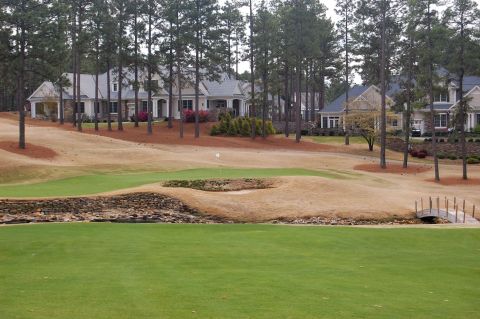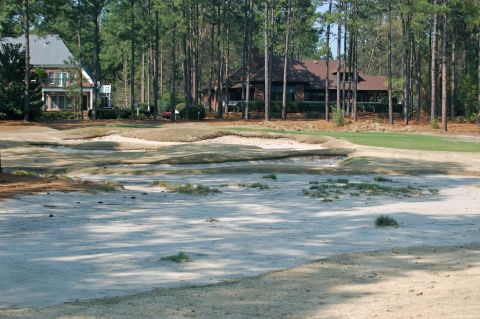In the southern U.S. there are two areas whose mere mention evokes the instant response “Golf!” Myrtle Beach is one and Pinehurst is the other, but the two promise decidedly different experiences. Myrtle Beach is first and foremost a place for golfing buddies to indulge their inner-teenager over long weekends of play, both on and off the course. Neon is the dominant design motif at the heart of Myrtle Beach. Pinehurst and the adjoining Southern Pines, NC, on the other hand, offer a classier experience. Golfing buddies searching for a bar in the Sandhills region at the end of a 36-hole day are most likely to find it in a refined hotel or quiet restaurant, with no neon to guide the way.
Where Myrtle Beach shouts, Pinehurst whispers.
The name of the famed local resort with the eight golf courses, including the newly renovated #2 designed by Donald Ross, is simply “Pinehurst,” which makes branding a little difficult for the dozens of other golf courses in the immediate area. And because Pinehurst is also a sprawling golf community, it makes it doubly difficult for other area golf communities to distinguish themselves.

The 1st at National Golf Club exemplifies the wide fairways and aggressive bunkering throughout the Jack Nicklaus layout.
The National Golf Club's "Cottage" industry
Despite a name that does not communicate “community,” the National Golf Club in Southern Pines tries hard to stand apart and, for the most part, succeeds, in large measure by offering a unique group of fractional share units called The Cottages, the only such units in a golf community in the Pinehurst area. The rest of its appeal –- to retirees, second-home owners, resort golfers, and package golfers staying at nearby hotels –- puts it squarely up against the mighty Pinehurst golf resort, which goes after a similarly eclectic golfing crowd. If Pinehurst the town is a destination, then Pinehurst the resort is the destination within the destination, and its competitors are hard pressed to differentiate themselves without over-spending on marketing. Actually, National might benefit from sharpening its appeal to just one or two of the targets it currently tries to attract. To go a bit Old Testament about it, if you are David going up against Goliath, just one or two stones are easier to sling than a boulder. In the aforementioned Cottages, the National possesses an inherent lure for a second-home owner audience that it is pursuing aggressively.
I stayed in one of The Cottages during a recent visit to the gated community, and I can testify that the units are spacious, comfortably appointed and reasonably priced. They are targeted at those who might otherwise be looking at second homes to use just a few weeks a year. Cottage owners purchase a 1/13th share in a unit, which grants them a minimum of 21 days a year access. Two-bedroom Cottages (1,650 square feet) are priced from $84,000, four-bedrooms (2,616 square feet) from $96,000. Annual dues begin at $3,604, which covers all maintenance (inside and out) and golf and fitness club membership, which includes green fees, cart fees and all the range balls you can slam, as well as access to indoor pool, fitness equipment and other amenities. The only other costs are related to your stays, modest fees for trash removal, maid service and, if you want the refrigerator filled on your arrival, a $25 shopping fee (in addition to the cost of groceries).

The fractional share Cottages line up attractively behind the 5th green and 6th tee.
A $500,000 villa, for a fraction of the cost
The unit I stayed in had all the comforts of home, and then some (including a nice working nook for me and my laptop). The kitchen opened up to a dining area adjacent to a spacious living room on one side (with big screen TV hung on the wall over the fireplace) and an enclosed patio on the other. The bedroom I chose looked across the 6th tee and down to the 5th green beyond, and its en suite bath area included both a huge stone shower and separate tub. The furnishings were well chosen and gave off a private-home vibe more than a resort one. In the pantry I found a pound of my favorite brand of coffee (how did they guess Peets?) and, surprise, the coffee maker was clean and made an excellent brew, totally absent any of the rancid taste produced by every hotel coffee maker in America.
Ownership in the fractional share is deeded, which means you can sell your share in the unit as you would a home, or pass it on to your heirs; and if space is available, as I was told it almost always is, you can add more days or even weeks during the year based on a slightly complicated formula we need not bother ourselves with here.
In my experience, a four-bedroom condominium located on a Jack Nicklaus golf course in a community similar to The National would price out around $500,000. Add another $50,000 for the type of furnishings The Cottages include, as well as wireless Internet, cable television and other extras, and a condo equivalent to those offered at The Cottages would run between $550,000 and $600,000. An outlay of $96,000, therefore, for a family that goes on a golf vacation a few weeks each year seems quite reasonable, especially with the easy access to golf. Of course, those who crave a beach during the summer will not be satisfied, but those who crave fun and challenging golf will be rewarded.

The approach to #10 at National Golf Club.
The fun part of the golf experience at National was in the generous fairways spread between the large stands of pine trees and leading to some impressively large and variable green complexes. Nicklaus rewards accurate left to right ball flight at The National, as he does at so many of his other early courses (and as he did in his professional career). This can become a little grating for happy hookers, but the fairways at the elbows are wide enough to accommodate a draw, if not a pull-hook (no course should let you “off the hook” for a bad swing). The bright green, over-seeded fairways laid down between the tan color of the dormant rough provided perfect directional runways from the tee boxes (see photos).
The greens are generally enormous, and some will require a two or even three-club adjustment between pin positions at front or back. Many of the greens are pushed up a bit above the fairways, and 40-yard chips and runouts along the entire span of a putting surface are not unusual but certainly preferable to chips from the short side of the green to pins set just at the bases of swales. The greens were not cut down to mid-season speeds, but when they are, positioning will be especially key.

Waste of time: The 16th at National Golf Club features a wide expanse of waste bunkers.
The Golden Bear, as he does on virtually every one of his “Signature” courses, used a few of those pine trees to interrupt direct drives between tee box and greens at The National. Although big hitters might be tempted to play straight through or over the trees, the prudent will play around and turn the routing into a dogleg right or left (or either, when the tree is smack in the middle of the fairway). Play Nicklaus golf courses enough, and your attitude about those trees changes over time from “what did he do that for?” to a better understanding of the principle of risk, reward and stimulating natural golf design.
Fine layout, from beginning to (especially) end
In spite of the generally flat nature of the Sandhills area, the course features a few changes in elevation, nothing dramatic but just enough to keep you on your toes (especially if you have a side hill lie in one of the deep bunkers). Some of the longer holes, like the 18th (called Bear’s Valley) can also knock you back on your heels; from the Gold tees (6,632 yards total), the finishing hole plays a robust 434 yards downhill, a fitting finale to the series of doglegs right. The tendency is to play it safe off the tee box toward the left side of the fairway, avoiding the deadly grove of trees on the right. But a long approach from the left side of the fairway or rough must carry the lake that guards the entire green from short left to behind. A bunker nestled between the water and the green provides one last bit of challenge for those who carry the lake (or pull their approach from the right half of the fairways). Anyone who finishes a round at National with par on the 18th should feel justifiably proud.
The National Golf Club displays excellent bones in its centerpiece golf club, attractive upscale single-family homes and unique fractional share program in The Cottages. Its core appeal would seem to be to second-home owners and retirees looking for a quiet lifestyle in a golf-centric area. Some years ago, the members pushed to take the club private, and even purchased the club from developer Claude Smith. It took less than a year before the harsh reality of golf club operations compelled the members to implore Smith to take it back, which he did. Since then, the economic realities of recent years have forced the developer to accept an increasing amount of outside play which may, over time, erode some of the benefits of privilege and dues that members count on (e.g. the ability to walk up and play after a short wait).
There is some sorting out to do at The National in terms of focusing its marketing efforts, but as resort golf communities go, this is an attractive, mature and, from all evidence, vibrant development. The members I played my round of golf with, from Connecticut and Hong Kong, seemed quite pleased with the choices they and their wives made to live at The National, and they seemed non-plussed about the additional non-members playing their course. Perhaps as the economy improves and membership grows, reliance on outside play will wane, and National’s members and their club’s owners can get back to where they once belonged.
*
National Golf Club, Southern Pines, NC. Web: NationalGolfClub.com. Designer: Jack Nicklaus. Yardage/Rating/Slope…Black Tees: 7,132/75.1/143. Gold: 6,632/72.3/135. Blue: 6,150/70.2/128. White (women’s): 5,474/72.3/129. Red: 5,006/70.3/119. For more information or an introduction to the real estate associates at The National, please contact Editor Larry Gavrich.


The finishing hole at National is beautifully constructed, and a challenge, from tee (top) to green. Beward the left side of the fairway; the approach is filled with treachery.



 (from the tips) appears to be the green itself, which is protected by a boulder studded hill on the left and a steep falloff in front and on the right. I pulled my iron shot (from the 143 yard tees) over the mound on the left and thought I would find a flat spot about pin high. Instead, my ball hit some unseen hard object and bounded sideways past the cup, down the embankment on the right side and into the bunker. It turned out not to be a bad bit of fortune because the up and down was fairly routine, as bunker shots go.
(from the tips) appears to be the green itself, which is protected by a boulder studded hill on the left and a steep falloff in front and on the right. I pulled my iron shot (from the 143 yard tees) over the mound on the left and thought I would find a flat spot about pin high. Instead, my ball hit some unseen hard object and bounded sideways past the cup, down the embankment on the right side and into the bunker. It turned out not to be a bad bit of fortune because the up and down was fairly routine, as bunker shots go.































